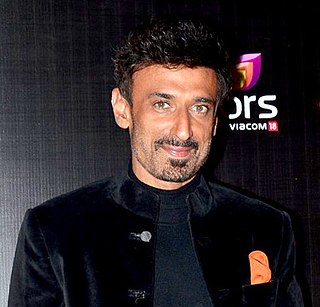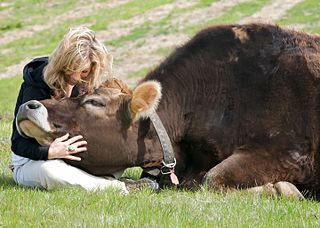Top 95 Vegetarianism Quotes & Sayings - Page 2
Explore popular Vegetarianism quotes.
Last updated on November 23, 2024.
Vegetarianism functioned as a purification. When you eat animals you are more under the law of necessity. You are heavy, you gravitate more towards the earth. When you are a vegetarian you are light and you are more under the law of grace, under the law of power, and you start gravitating towards the sky.
The average age (longevity) of a meat eater is 63. I am on the verge of 85 and still work as hard as ever. I have lived quite long enough and am trying to die; but I simply cannot do it. A single beef-steak would finish me; but I cannot bring myself to swallow it. I am oppressed with a dread of living forever. That is the only disadvantage of vegetarianism.
I think the mother of all arguments against eating meat now is the climate change argument. Methane is a much more powerful greenhouse gas than carbon dioxide and when we eat meat we wipe away many of the good things that we do when we try to create greener and more sustainable practices in the rest of our lives. So if you add the concern for climate change with other concerns that were there. I think the case for vegetarianism is pretty overwhelming.
Vegetarianism that is me. I don't eat meat. It's been over 10 years. Actually it's been 11 and a half years and I feel good and I feel like I look good and I have energy& and you have to look at what you're putting in your body. I eat vegetables and I eat grain and I take care of myself and I don't think I look that bad, do I?
It is not how we breed, keep and kill animals for human consumption that has been the impetus for vegetarianism for thousands of years. It is that we breed, keep and kill animals for human consumption. Throughout the centuries the common thread in the arguments against eating animals is the fact that since we have no nutritional requirement for the flesh or fluids of animals, killing them to simply satisfy our taste-buds or habits or customs amounts to senseless slaughter, and senseless slaughter is no small thing.
Vegetarianism preserves live, health, peace, the ecology, creates a more equitable distribution of resources, helps to feed the hungry, encourages nonviolence for the animal and human members of the planet, and is a powerful aid for the spiritual transformation of the body, emotions, mind, and spirit.
Vegetarianism has nothing to do with religion: it is something basically scientific. It has nothing to do with morality, but it has much to do with aesthetics. It is unbelievable that a man of sensitivity, awareness, understanding, love, can eat meat. And if he can eat meat then something is missing he is still unconscious somewhere of what he is doing, unconscious of the implications of his acts.
Although I have been prevented by outward circumstances from observing a strictly vegetarian diet, I have long been an adherent to the cause in principle. Besides agreeing with the aims of vegetarianism for aesthetic and moral reasons, it is my view that a vegetarian manner of living by its purely physical effect on the human temperament would most beneficially influence the lot of mankind.
The wrongfulness, the immorality of eating animal food has been recognized by all mankind during all the conscious life of humanity. Why, then have people generally not come to acknowledge this law? The answer is that the moral progress of humanity is always slow; but that the sign of true, not casual Progress, is in uninterruptedness and its continual acceleration. And one cannot doubt that vegetarianism has been progressing in this manner
Pythagoras was the first to introduce vegetarianism to the West. It is of profound depth for man to learn how to live in friendship with nature, in friendship with creatures. That becomes the foundation. And only on that foundation can you base your prayer, your meditativeness. You can watch it in yourself: when you eat meat, meditation will be found to be more and more difficult.
Jainism is the first religion that has made vegetarianism a fundamental necessity for transforming consciousness. And they are right. Killing just to eat makes your consciousness heavy, insensitive; and you need a very sensitive consciousness - very light, very loving, very compassionate. It is difficult for a non-vegetarian to be compassionate; and without being compassionate and loving you will be hindering your own progress.
Meat-fetishiser that I was, I used to find willed vegetarianism inexplicable. It was one thing to be a vegetarian because of religious and caste reasons - something I was familiar with because of my Indian upbringing - but to choose to be a vegetarian when you could eat meat for every meal every day? That seemed madness to me.
Try vegetarianism and you will be surprised: meditation becomes far easier. Love becomes more subtle, loses its grossness — becomes more sensitive but less sensuous, becomes more prayerful and less sexual. And your body also starts taking on a different vibe. You become more graceful, softer, more feminine, less aggressive, more receptive.
Vegetarianism is not implicitly important for the mental progress or the intellectual development, unless it is supposed to be a remedy to clean the body from slag. A temporary abstinence from meat or animal food is indicated only for very specific magic operations as a sort of preparation, and even then only for a certain period. All this is to be considered with respect to sexual life.
Almost always when I told someone I was writing a book about "eating animals", they assumed, even without knowing anything about my views, that it was a case for vegetarianism. It's a telling assumption, one that implies not only that a thorough inquiry into animal agriculture would lead one away from eating meat, but that most people already know that to be the case.
The vegetarian movement ought to fill with gladness the souls of those who have at heart the realization of God's kingdom upon earth, not because vegetarianism itself is such an important step towards the realization of this kingdom (all real steps are equally important or unimportant), but because it serves as a criterion by which we know that the pursuit of moral perfection on the part of man is genuine and sincere.
No vegetarian has been able to achieve a single Nobel prize. It is a clear-cut condemnation of vegetarianism. Why do all the Nobel prizes go to non-vegetarians? - because vegetarian food does not contain those proteins which create intelligence. And unless we provide those proteins, intelligence cannot grow. The body is a very delicate phenomenon and it needs a very well balanced diet.
With me, meditation is the only essential religion. And everything that follows it is virtue, because it comes of its own accord. You don't have to drag it, you don't have to discipline yourself for it. I have nothing to do with vegetarianism, but I know that if you meditate you are going to grow new perceptivity, new sensitivity, and you cannot kill animals.
It is beyond doubt that the chief motive of Vegetarianism is the humane one. Questions of hygiene and of economy both play their part, and an important part, in a full discussion of food reform; but the feeling which underlies and animates the whole movement is the instinctive horror of butchery, especially the butchery of the more highly organized animals, so human, so near akin to man.
























